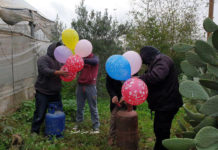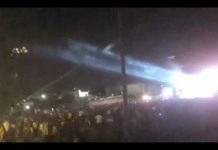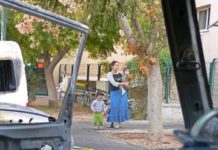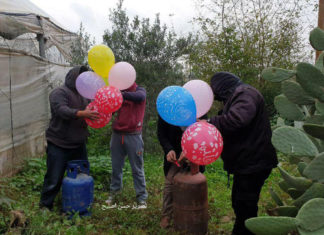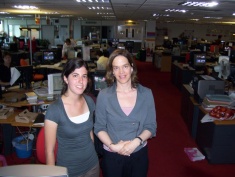
Many times after a lecture, people have come up to me and stated that they had no idea how terrible the rocket situation in Sderot and the Western Negev was in reality. “They call these homemade rockets on the news,” one woman told me after I spoke at her synagogue in St. John’s Wood. “What the media doesn’t show is that these ‘homemade rockets’ can cause so much destruction.”
When I spoke this past Shabbat at Barnet Synagogue on the edge of London, another woman came up to me and asked if it was true that a grad-Katyusha rocket had hit a mall in Ashkelon. “I heard about the attack only last night,” she said. The rocket attack on the Ashkelon mall had taken place over a month ago. Over 90 people were wounded when the roof came crashing down from the impact of the rocket explosion.
It is strange that in a country that is home to the largest broadcasting corporation in the world, the BBC, people remain so unaware and uninformed of the situation and threat that exists in southern Israel.
I actually visited the BBC to meet with Olivia MacLeod, an interactive broadcast journalist who initiated a letter-writing project between an Arab girl from Gaza named Mona and myself while I was living and working part time in Sderot. The BBC carried our letters three times on the website, garnering a widespread reaction from the international community.
I had a good visit with Olivia. We chatted about Sderot, the rocket situation, what I do at Sderot Media Center, and the letters between Mona and I. Olivia introduced me to her colleague, Martin, who had visited Sderot back in December with Sderot Media Center. I got the impression that Martin was quite sympathetic to the plight of Sderot residents. Unfortunately, I did not get the chance to meet with Tariq, the head of Olivia’s Middle East department.
Back in March 2008, the BBC launched an Arabic speaking channel, free to North African and Middle East residents with satellite or cable connection. This is the BBC’s second attempt to launch an Arabic channel after the first closed in 1996 because of an editorial dispute with its Saudi funders.
The most moving experience for me took place on Shabbat, when I discovered that one of the people at my lecture was a Sderot native, Rachel, who had moved to London with her English husband. Rachel had lived in Sderot all her life and still has family living there, including her brother.
She had visited Sderot with her children over Passover and told me her kids are still recovering from the trip. “Only this Shabbat morning, my little one wakes up yelling “Shachar Adom,” said Rachel. “My son had watched the news from Sderot the day before and [we] experienced the sirens and rocket explosions several time during our past visit to Sderot. My kids are still experiencing trauma from those explosions and red alert sirens today back in London.”
A story for the BBC? I should think so, but at this time, the story of Sderot and the Western Negev rarely makes it to the British media. “The only way we find out what is going in Israel today and in Sderot is by accessing Israeli newsites,” an Englishman told me.



